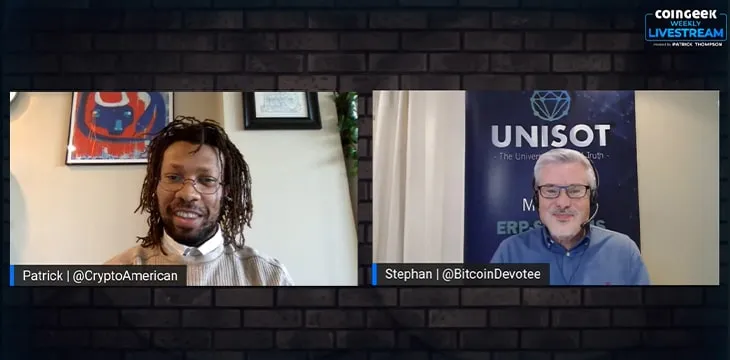|
Getting your Trinity Audio player ready...
|
Roughly one-third of the food produced globally is wasted, with most of the loss happening along the global supply chain. One company which makes use of blockchain technology aims to reduce that number and make an impact, specifically in the seafood industry global supply chain.
This week on the CoinGeek Weekly Livestream, Patrick Thompson sits in for Kurt Wuckert Jr. and speaks to Stephan Nilsson, CEO of UNISOT and Abendum.
UNISOT is an enterprise supply chain management platform that uses blockchain as a service. Nilsson says “the efficiency in global supply chains today from seed to plate or from egg to plate… amounts to more than 80 percent waste.”
Nilsson’s extensive work on the ERP software—a system that large companies use to handle backend activities—has led him to believe, the system in itself is problematic. “It’s very slow, expensive and not very flexible.”
He came across the Bitcoin white paper and was later convinced of Bitcoin SV’s capability to solve efficiency problems hounding the global supply chains today. “Here we have a solution to the problem,” Nilsson says. “We can use Bitcoin and blockchain as a global data layer.”
As Nilsson explains, a lot of manual work is still happening in today’s global supply chains—people signing papers, issuing certificates, using stamps for product verification purposes. With a blockchain system in place, he says the manual work can be digitized leading to lower costs. “Thanks to this public blockchain we can now build these systems with cost efficient transactions.
In February 2020, UNISOT launched SeafoodChain, a company that uses blockchain technology to securely track seafood from its origin to its consumer.
More recently, they launched Abendum, a company that also makes use of blockchain technology, only this time in keeping track of accounting records. The service is so unique in a sense that it includes a ‘triple entry accounting’ capability. “Abendum does not replace the current accounting system in companies,” Stephan explains. “It’s an add on at the moment that offers this functionality of triple entry accounting.”
Double entry accounting is commonly used in companies today, this means there is a debit and credit transaction taking place. With triple entry accounting, a third layer—blockchain—is added between the two parties with transactions being recorded on a public ledger. “By putting this on a blockchain and signing it digitally, every transaction will be verified in the blockchain and that makes the auditors job a lot easier,” Nilsson explains. “We could save between 50 and 80 percent of the auditing costs.”
What’s next for UNISOT? The company is launching a series of new products onto the market. A non-fungible token or NFT that tokenizes a physical asset in the blockchain. “This technology is what we call smart digital twins,” Nilsson says. “We create a digital representation of a physical object in the blockchain.”
A ‘digital product passport’ will be launched as well. This makes use of a scannable QR code on the package that displays information about the product, including but not limited to—its place of origin, ingredients and the process it had to undergo.
And if those weren’t enough, Nilsson has a few more surprises up his sleeves that are expected to roll out in the coming weeks.
Watch the episode 11 below, and check out previous episodes of the CoinGeek Weekly Livestream on YouTube.

 07-08-2025
07-08-2025 





